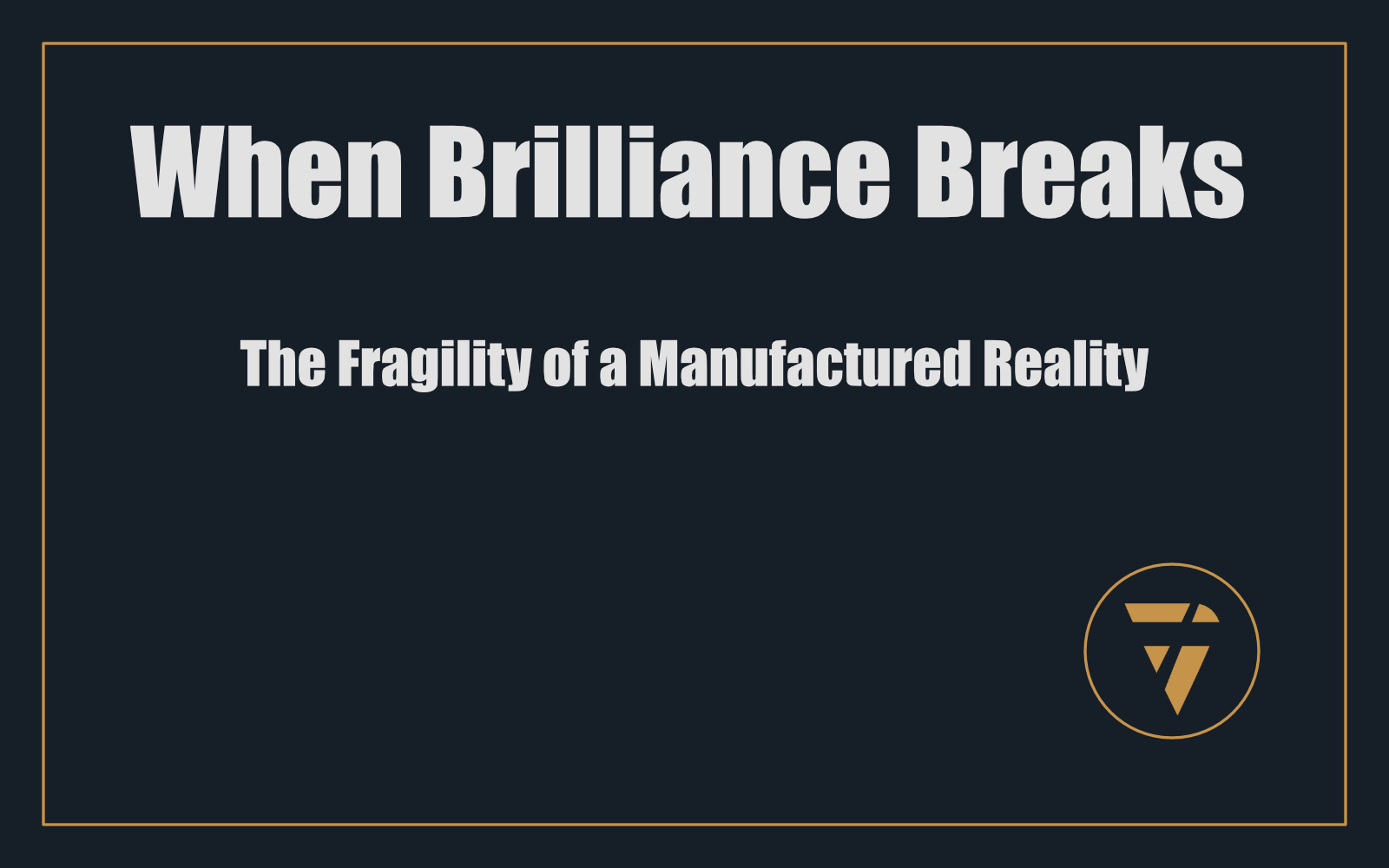When Brilliance Breaks

The Fragility of a Manufactured Reality
We knew it was coming.
Not because we wanted it to happen. Not because anyone had planned it. But because, eventually, in every truly ambitious business venture, the truth has to show up. And truth doesn’t care about credentials. It doesn’t bend to ego. It doesn’t accommodate for charisma. It just… is.
And when the truth finally arrived—when someone had to tell the genius they were wrong—it broke everything.
This isn’t a story about ego. It’s about brilliance. The kind of brilliance that can light up a room, galvanize a team, and solve problems no one else can even see. But it’s also about what happens when that brilliance is mistaken for universal wisdom. When someone so good at one thing starts to believe they’re good at everything.
This is what happens when that illusion ends.
And I want to tell you what we learned.
The Opportunity
Let me be clear from the outset: this was an extraordinary opportunity.
One of the most high-potential ventures I’ve ever had the privilege to work on. A perfect collision of timing, talent, capital, and capacity. The kind of moment in business where everyone in the room is operating above baseline, where collaboration doesn’t feel like compromise, where the dream isn’t abstract—it’s operational.
At the heart of it was a person whose domain expertise was unmatched. Truly elite. There are, maybe, five people in the world who do what they do at the level they do it. Working with them was like watching a concert pianist at work—muscle memory, nuance, instinct, and total command of the subject.
And for a while, that was enough.
They carried weight. They deserved it. We let them take space, lead with certainty, assert without hesitation. We accepted their opinions on other topics, even when they drifted outside their lane, because… well, they were brilliant.
Until the day came when we couldn’t anymore.
The Setup
It didn’t happen overnight. These things never do.
We started to see small cracks. Unchecked assumptions. Dismissals of data. Opinions delivered as fact in areas where they had no experience.
But they were still performing at such a high level in their area that we deferred. We adapted. We worked around them. We covered quietly, collaborated carefully, and held our breath a little longer than we should have.
Because the stakes were so high. And because this person was that good.
That’s the trade we often make in business. We tolerate misalignment for the sake of output. We allow dominance in one lane to cast shadows over the rest of the road. We mistake certainty for strategy.
And then one day, that approach becomes unsustainable.
The Moment
We found a critical error. Not just a small bug or a difference of opinion. A flaw in the business programming logic that would break everything we were building. A misalignment of infrastructure that would have, without a doubt, cost millions, tanked deliverables, and compromised the integrity of the entire system.
It was not their fault that it happened.
But they couldn’t let it go.
When we presented the facts—carefully, respectfully, repeatedly—they refused to accept it. Insisted we were wrong. Demanded we reverse our position. Used their authority to try and shut down the correction.
We held the line.
For the first time in the entire history of the project, the team said no.
And it broke them.
The Fallout
They left the room.
They fired the team.
They shut down the project.
They tried to pull all of our access, collapse all of the infrastructure, erase the work that had been done.
All because—for the first time, for one moment—they had to sit with the possibility that someone else was right. That their authority was limited. That the thing they believed so strongly in, the thing they pushed so hard for, was based on a misunderstanding.
It wasn’t even malicious. It was just wrong.
And that, it turned out, was unacceptable.
What’s Really Going On Here
This wasn’t just about a difficult personality.
This was the culmination of a pattern we are seeing play out all over the business world right now:
- Hyper-specialized individuals raised on a diet of Peterson, Rogan, Fridman, and Carlson.
- Confidence mistaken for competence.
- Rhetoric mistaken for thought.
- Fragility wrapped in intellectual arrogance.
They are brilliant. They are powerful. They are persuasive. But they are not trained for failure. They are not trained to collaborate. They are not trained to say the words, “I don’t know.”
They are terrified of reality. When they don't control objective fact, their world doesn't exist.
Because we mistake charisma for capability, we put them in rooms where they hold sway over decisions far outside their lane. We let them monologue instead of listen. We let them lead, not because they’re right, but because they won’t let you say otherwise.
Until you do.
And then everything burns.
Leadership Isn’t Certainty. It’s Resilience.
The myth we’ve sold for too long is that leaders are supposed to know. They’re supposed to have answers. They’re supposed to be unwavering.
That’s wrong.
Real leadership is the ability to adapt. To ask better questions. To know when to shut up. To listen. To be challenged. To change your mind. To invite someone else’s truth into the room, even when it contradicts yours.
The person at the centre of this project had none of that.
And when they lost control of the narrative, they didn’t regroup. They detonated.
And in the wreckage, we learned everything we needed to know.
The Cost of Silence
We let it go for too long.
And that’s on us.
We allowed the illusion to flourish because it was convenient. Because the project was good. Because the outcome mattered. Because we thought we could handle it.
We were wrong.
You cannot build a future on a foundation of fragility.
You cannot keep pretending someone is right just because it’s easier than telling them they’re wrong.
You cannot trade the long-term integrity of a project for the short-term comfort of avoiding confrontation.
Not if you’re serious.
Not if you care.
Not if you want to lead.
What Do We Do Now?
We rebuild.
And we do it better.
Here’s what we’ve learned, and what we now bring into every room:
- Contain the Brilliance
Expertise is incredible. But it must be contained. Brilliant people are not gods. They need parameters, feedback, and challenge—just like everyone else. - Normalize Being Wrong
Make it safe to fail. Make it common to shift positions. Celebrate the people who say, “I hadn’t thought of that,” and mean it. - Separate Confidence from Competence
Learn to spot the difference. Confidence is a performance. Competence is a pattern. Build your business around patterns. - Refuse the Cult of Personality
Do not let charm override facts. Do not let volume replace truth. You are not building a fan club. You are building a business. - Build Teams, Not Tribes
If everyone agrees, your team is useless. Create space for dissent, disagreement, and depth. That’s where strength lives.
And Finally, A Note to the Genius
You were never the enemy.
You are brilliant.
But brilliance without humility is a house of cards.
We admire your skill. We respect your gift. But you have to know this: being right in one domain does not make you a leader. It makes you valuable. But if you want to lead? You must learn to lose. You must learn to listen. You must learn to let other people be right—even when it hurts.
Because that’s what changes the world.
For the Rest of Us
Let this be the lesson we needed. The pain we earned.
It’s not enough to be brilliant. You must be resilient.
It’s not enough to be right. You must be ready to be wrong.
It’s not enough to speak. You must learn to hear.
We can’t afford to build businesses on bluster. We must build them on truth.
And truth, whether whispered or shouted, always wins.
This is where we begin again.
Stronger. Smarter. Clearer.
Building the future.
On purpose.
This is what I’m working on. Tell me what you think, I enjoy the conversation! Subscribe and follow the work in real time.
Thanks!
B

We told the genius they were wrong. The project exploded. Not because we were harsh, but because it was the first time anyone had ever said no. Expertise without humility isn’t strength. It’s a time bomb.
PS -






